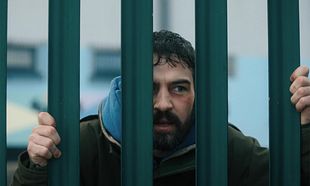Richard and Mildred Loving (Joel Edgerton and Ruth Negga) are an interracial couple in Virginia during the racial miscegenation laws of the '60s. After both are arrested for their marriage, they're forced to leave and set up a new life in the city - but soon begin to work towards returning home to Virginia.
Given how often so many Oscar-bait dramas tend towards the use of heightened drama with key scenes riven with emotional outbursts, it's so heartening to see a film like Loving that has just as much as emotion as any of these - but uses it with such economy and deftness that it's devastating. The film opens with Negga and Edgerton, sitting on a porch and reeling from the news that they're pregnant. It's such a tender scene and it's done without any pomp or circumstance. They're merely two people, in love, and now with child. The story progresses easily enough and, before long, the reality of their situation settles in - they're an interracial couple in a time and place where society and the general feeling is against them.
Yet again, director Jeff Nichols' smart direction comes into play. There's no overbearing sense of hatred towards them, there's no overt signs of racism towards them. Instead, it's just a slight glance in a public place towards them or a small whisper and tut from others. There's only one or two scenes where it's made plain what is against them and, again, it's done with such intelligence that it's breathtaking. Yes, people out there may not like them, but who cares? Who are they hurting? That's the key theme of Loving; the idea that two people who love each other and wish to live together can do no harm to anyone.
Negga and Edgerton's performances are so slight and natural that it drills down to small looks and ticks between them, but it makes them all the more convincing. Their love isn't showy or expressive; it's in the small, delicate moments between them that we see it - something as simple as the two of them laughing at a TV show, draped across one another in domestic bliss. Likewise, when they're imprisoned and charged under the race laws, there's no elongated speech to the court defending themselves. The finale of the film, with Nick Kroll as the ACLU lawyer assigned to their case, encapsulates the entire film in one scene. When asked what he wants to say to the Supreme Court, Joel Edgerton merely replies that he loves his wife.
Nichols' direction is a masterclass in subtlety and understatement. As mentioned, there's no showreel for the Oscars or orchestral swell that signposts the film for audiences. The sweet, gentle love that exists between the Lovings is rooted in home, domesticity and a look or acknowledgement between them. His screenplay, as well, uses this tenet throughout. Both Negga and Edgerton are given more than enough room to breathe and inhabit scenes, but instead choose to nod and look to one another for comfort and strength. That's real. That's what a real, loving relationship between two real people looks like.
At its heart, Loving is just about that - loving someone, in spite of the difficulties that may arise from it. You walk away from the film, truly wondering how anyone could have it in their heart to hate these people when all they want to do is live together as one and in peace.













































































